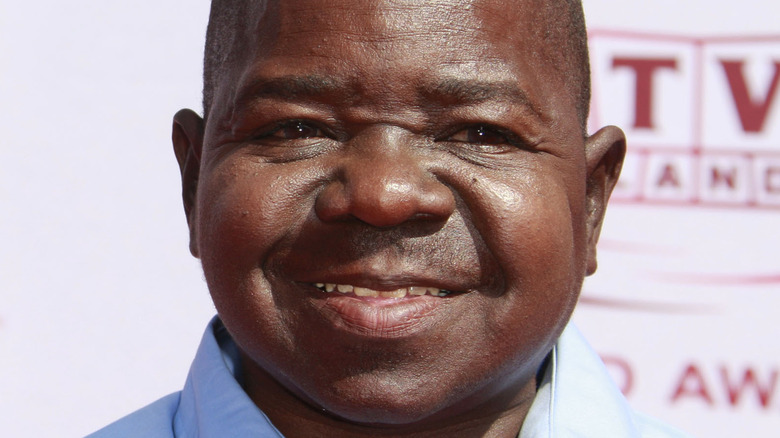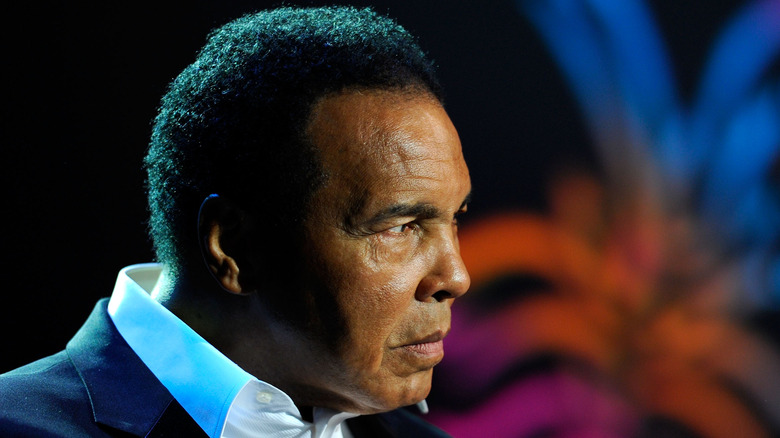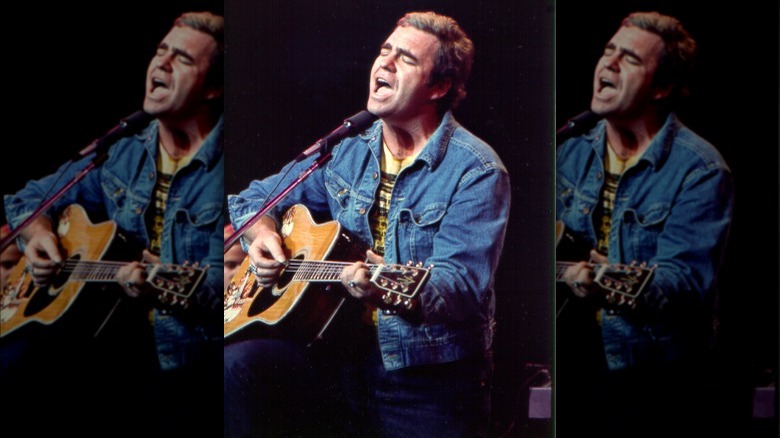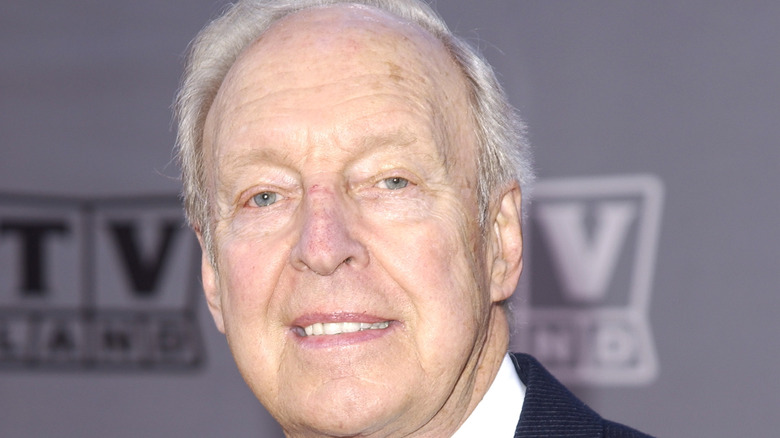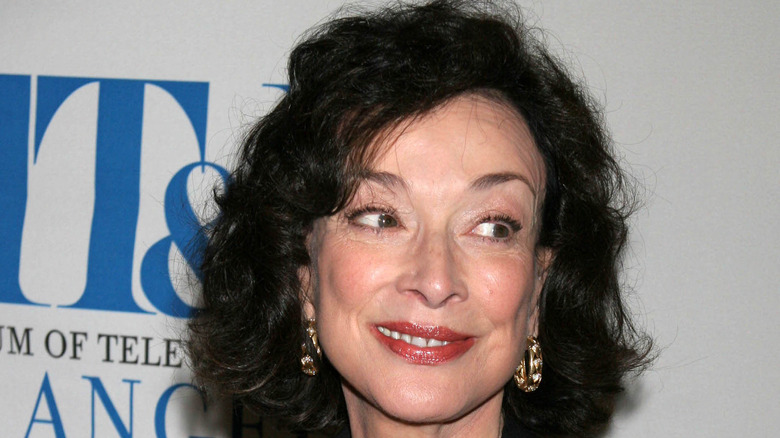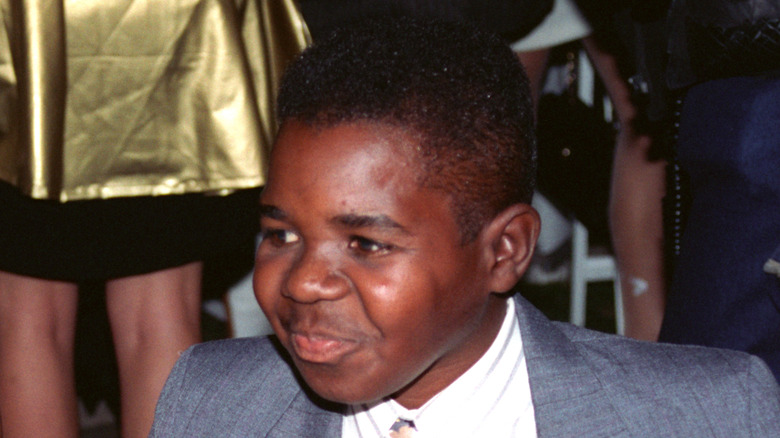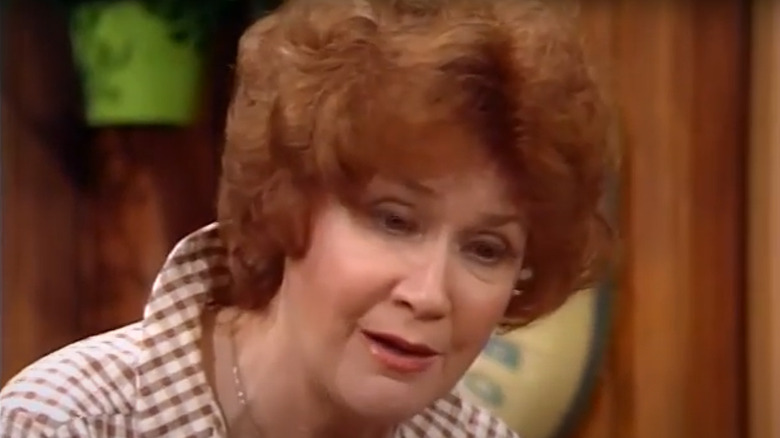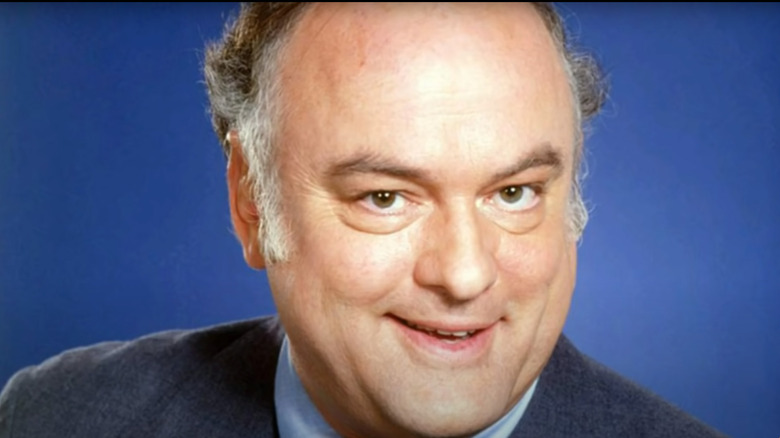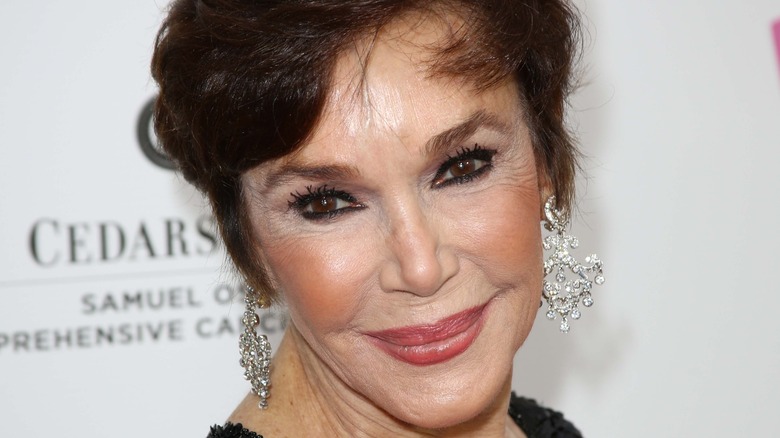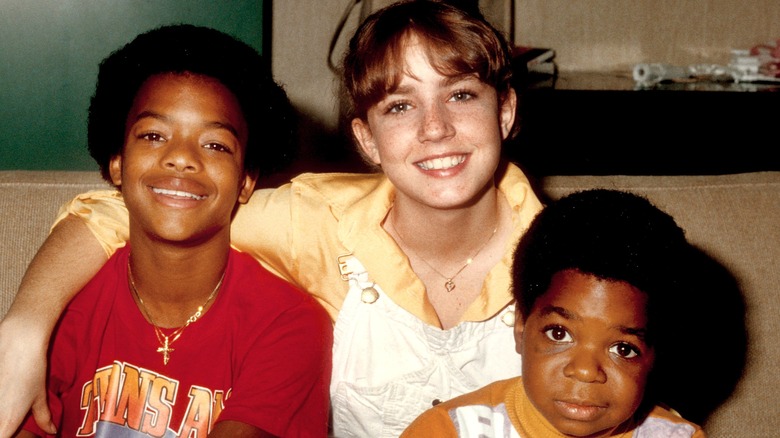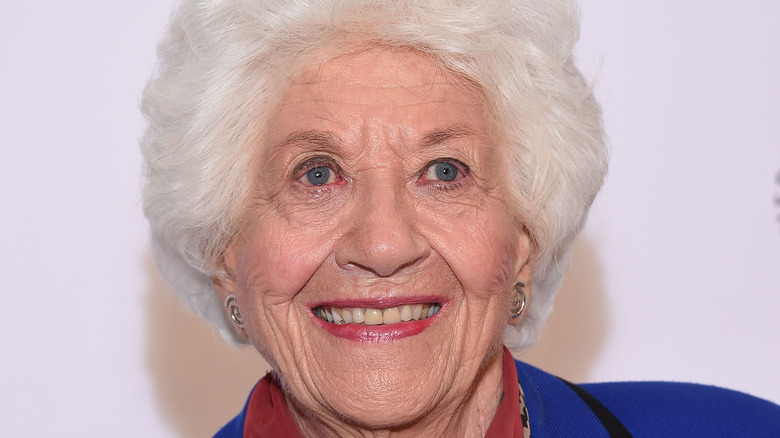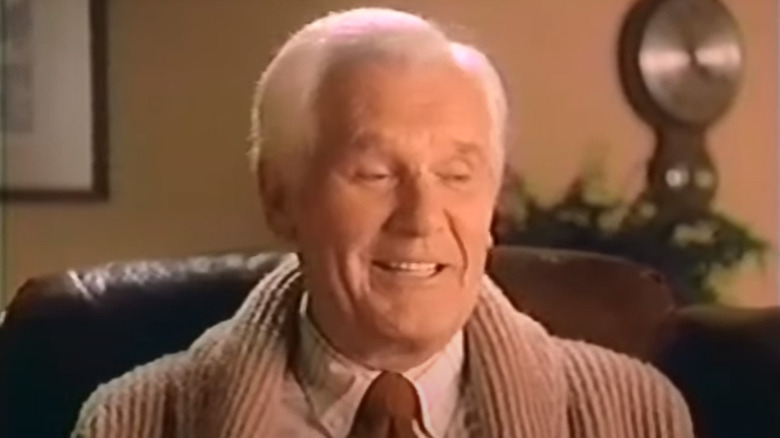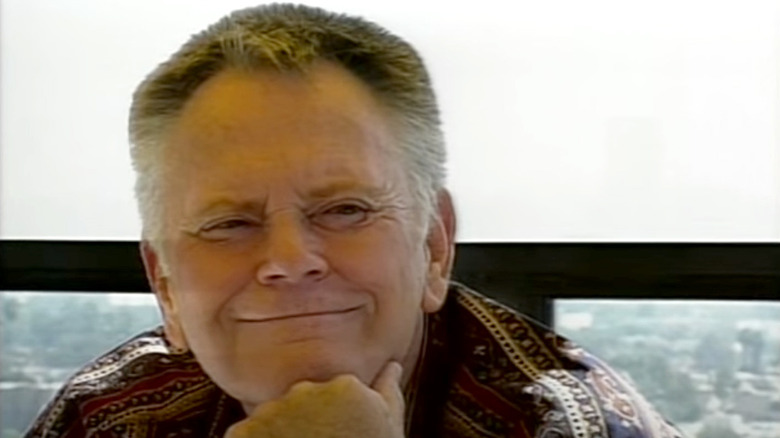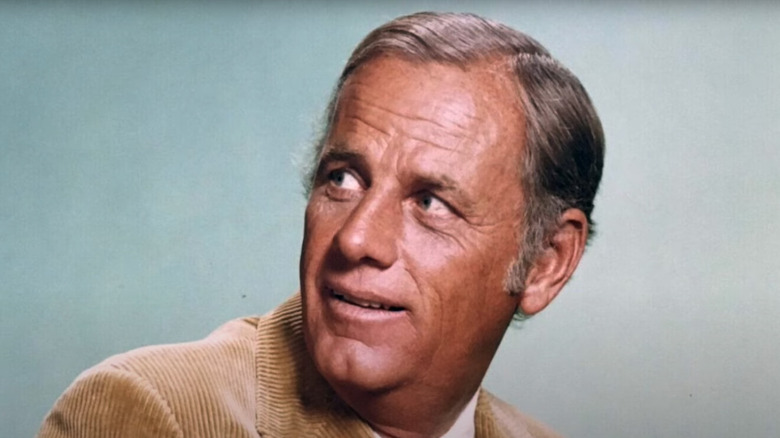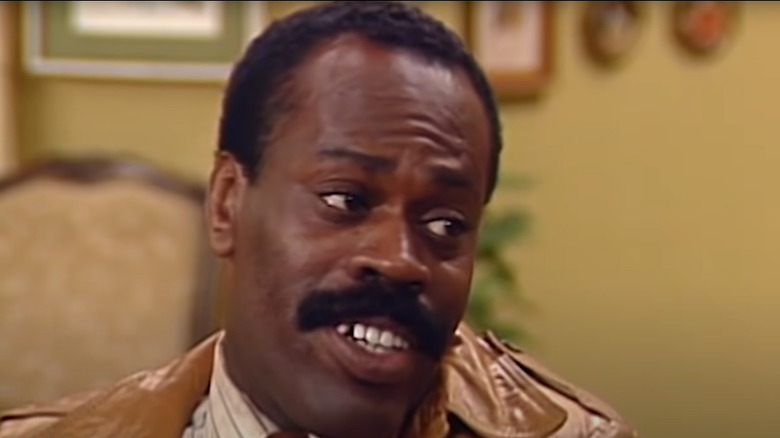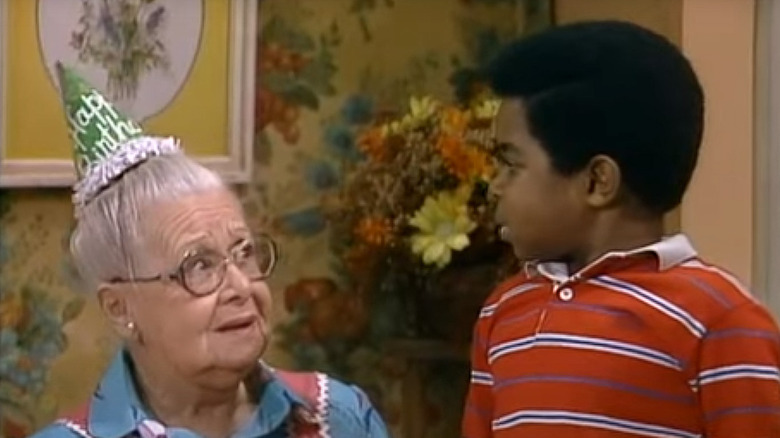Stars From Diff'rent Strokes You Didn't Know Died
The '70s were certainly a progressive period for African-American presence on prime-time TV, with most show casts allowing for more regular Black actors. A few others, like sitcoms "Good Times" and "The Jeffersons" were dominated by Black leads. But aside from regular appearances by the Willises on "The Jeffersons," networks often balked at the notion of mixed-race families in their time slots.
In 1978, "Diff'rent Strokes" changed a lot of that thinking. The sitcom starred Conrad Bain as Philip Drummond, a widowed wealthy businessman who adopted his late African-American housekeeper's two sons, played by Todd Bridges and Gary Coleman. Producers pitching the show had the title "45 Minutes From Harlem" in mind until further development resulted in a name change to "Diff'rent Strokes." While the sitcom was originally intended to be a star vehicle for Bain, who was a sensation as a conservative neighbor on "Maude," Coleman instantly became a show-stealer with a precocious and mischievous demeanor, and his oft-repeated "Whatchoo talkin' 'bout, Willis?" became a widely-used catchphrase among the show's new fans.
Largely because of Coleman's pint-sized charm, the show became must-watch fare for eight seasons, turning the young actor into an A-list star and thrusting fellow youngsters Bridges and Dana Plato (who played Bain's biological daughter Kimberly) into the spotlight. Sadly, Coleman and many of the show's core cast are no longer with us. The same goes for several luminaries who either managed a story arc or a few episodic lines.
Muhammad Ali
Boxing legend Muhammad Ali called himself "The Greatest," and anyone who argued the point by lacing up a pair of Everlasts and entering the ring found out the hard way the truth behind that declaration. Even after conquering the canvas, Ali dominated pop culture, apparently coming up with the phrase "Different strokes for different folks," which made its way into the sitcom's moniker. The flamboyant pugilist even scored a couple of appearances on the show. Playing himself, Ali enjoyed several scenes with Coleman, whose character Arnold Jackson worshiped the celebrity athlete as his favorite hero. That idolatry was no surprise, since millions of fans praised Ali for more than just his heavyweight boxing record. He was a high-profile role model for African-Americans as well as an inspiration to Muslims, having converted to Islam early in his boxing career.
Save for playing himself in the 1977 Ali biopic "The Greatest," and appearances on shows like "Vega$," and "Diff'rent Strokes," Ali seldom acted. He didn't need to, since his life story eclipsed almost any fictional account of any boxer past or present. But aside from winning heavyweight championship belts, lighting the torch during the opening ceremonies of the 1996 Summer Olympics in Atlanta was a feat Ali remarked was one of the greatest honors ever bestowed to him, per CNN. Remarkably, he performed his torch duties while suffering from Parkinson's disease, a condition doctors discovered in his brain in 1981, forcing his retirement. Ali died from Parkinson's at 74.
Hoyt Axton
Admittedly folk singer Hoyt Axton's two appearances on "Diff'rent Strokes," in which he played Wes McKinney, father to Coleman's best friend Sam, might not have been among his more memorable cameos on prime-time television. But chances are, viewers may have wondered where they saw that face before. For sure, boomers would have recognized him on '60s Westerns like "Bonanza" and "Iron Horse," and later on sitcoms like "WKRP in Cincinnati" and "Growing Pains." He's relatively more familiar to movie audiences as Randall Peltzer who buys an exotic creature from an Asian novelty shop as a gift for his son in the 1984 scary outing "Gremlins." More recently, that rugged face graced big screens in "We're No Angels" and as the town mayor in "King Cobra," his last movie.
But as a songwriter, he became immortalized for penning "Joy To the World," a pop song he gave to U.S. band Three Dog Night, which became a hit overnight and has since been repeated not only on retro FM stations but in such movies as "Forrest Gump," "The Big Chill," and the Michael Moore documentary "Roger and Me." It didn't stop there as the song also found itself blaring out of TV speakers on episodes like "Friends," "Designing Women," Murphy Brown," "Sex and the City," and even two episodes of "The X-Files." The royalties from that song alone might have been enough for Axton to purchase a ranch in Montana, where he died of a heart attack at 61.
Conrad Bain
After six seasons playing Dr. Arthur Harmon, the conservative neighbor of liberal provocateur Maude Findlay in the politically-charged sitcom "Maude," Canadian actor Conrad Bain proved his mettle as a solid actor to warrant being awarded the lead in a sitcom. That opportunity came right after "Maude" left the air, when Bain was given the role of widowed Manhattan entrepreneur Philip Drummond on "Diff'rent Strokes." The twist was that Drummond would adopt two African-American boys, both sons of his recently-deceased housekeeper, to ensure stability in their lives. They also made Bain's character jollier and wiser than what he portrayed in Maude, necessary traits to curtail the drama of a new sitcom planning to deal with some heavy social issues from racial discrimination to drug addiction.
Even though one of the adopted kids, Gary Coleman, would prove to be the real draw for "Diff'rent Strokes," Bain was still viewed in a lovable, respectable light. A lot of that had to do with several years in show business that started with steady work in the TV soap "The Edge of Night," followed by prime-time drama "Studio One" during the '60s, and daytime drama "Dark Shadows: The Vampire Curse" the following decade. After his extensive stints in "Maude" and "Diff'rent Strokes," Bain went on to star as Charlie Ross in the short-lived political sitcom "Mr. President" and played Drummond on an episode of "The Fresh Prince of Bel-Air," his last acting gig. Bain died of natural causes at 89 in 2013.
Dixie Carter
At the start of the sixth season of "Diff'rent Strokes," the show veered into romantic territory when they added Dixie Carter as Maggie McKinney, a love interest for Philip Drummond. It wasn't long before wedding bells ensued and Maggie became part of the Manhattan-based household. But that scripted marital bliss vibe didn't exactly waft into the chaotic atmosphere of the set. According to Mental Itch, Carter and Gary Coleman reportedly fought while filming to the point where Carter left at the end of the season. In subsequent interviews, she would never comment directly on the conflict, but let out one tidbit during one exchange with the press. "I took that job for the money, nothing else, and that was all I got out of it," she said to the The Advocate-Messenger.
On paper, Carter was qualified for the role, having performed in Broadway shows like "Pal Joey" and landing prominent parts on the soap "The Edge of Night" and prime-time fare that included "On Our Own" and "Out of the Blue." After leaving "Diff'rent Strokes," she wasn't out of work for long, as she was hand-picked to play savvy entrepreneur Julia Sugarbaker on the successful sitcom "Designing Women" in 1986. Later in life, she also found work as recurring characters on "Ladies Man" and "Desperate Housewives," the latter earning her an Emmy nomination in 2007. Her last gig was "That Evening Sun," a movie starring her and husband Hal Holbrook. Carter died of complications from cancer at 70 in 2010.
Gary Coleman
When Gary Coleman first stole the "Diff'rent Strokes" spotlight at the age of 10, the charming and mischievous youngster unwittingly saw his life enter the fast lane of wealth, glamor and lots of public attention. Looking back at those changes in 1993, years after the sitcom ended, the actor wished that things had turned out differently. "If someone had told me my life would have been like this early enough where I could have got out, I would have got out," Coleman told Brad Lemack when he was in his 20s.
Money was of little comfort, despite being paid $2.5 million per season and having a trust account that apparently swelled to $18 million, per Celebrity Net Worth. But once he was old enough to access it, he found only $220,000 in his account, leading to a legal battle with his parents and handlers who misappropriated those funds. He won back $1.28 million, although taxes and legal fees whittled down that settlement considerably.
The child actor stigma combined with a congenital kidney disease that stunted his growth and created other serious health problems also hampered his employability, as Coleman could only land cameos on shows like "Married... With Children," "The Drew Carey Show," and "The Simpsons." He found work in hobby shops and as a security guard, which at one point resulted in receiving an assault charge. He eventually married, but still lived in poverty. Complications from a fall resulted in a brain hemorrhage in 2010, which killed him at 42.
Dody Goodman
Dody Goodman didn't need much to weaponize herself to get recognized in Hollywood. All she needed was an unfiltered wit executed by her Minnie-Mouse voice, and she could land gigs galore. It's not certain whether those tools helped her land a recurring role on "Diff'rent Strokes," playing Philip Drummond's activist-oriented sister, but it also didn't stop her from getting eight episodes of work out of the series, either. But it was that voice that made her recognizable, particularly on the soap satire "Mary Hartman, Mary Hartman," where she could be heard bellowing the moniker during the show's opening theme. She also played the title heroine's mother on the short-lived serial that has since become a cult classic.
During the '50s, when TV was still learning to crawl, Goodman first made her mark as the resident nutcase on "The Tonight Show," then hosted by Jack Paar, who found her wit and voice so enthralling, he'd often invite her to simply chat. That was when she'd unleash a few hilarious non sequiturs that had audiences rolling off their couches and had Goodman on the receiving end of an Emmy nomination. Decades later, talk show host David Letterman invited Goodman onto the show and would often get the same results.
After the "Hartman" series, the actress starred in its spin-off "Forever Fernwood," before landing additional spots on "Punky Brewster," "Murder, She Wrote," and "Boston Common." In 2008, Goodman died from natural causes at 93.
Gordon Jump
One of the more disturbing story arcs in the sitcom involved the Drummond family's friendship with a bike shop owner named Mr. Horton, portrayed by Gordon Jump, who turned out to have a dark side as a child molester. Even for a sitcom known to delve into controversial subject matter from juvenile delinquency to substance abuse, addressing child sexual abuse bordered on taboo in the late '70s and early '80s. Also surprising was that the culprit was played by Jump, better known for an entirely different set of characters, from a lonely repairman on Maytag commercials to the bewildered station manager from the prime-time comedy "WKRP In Cincinnati."
As if art imitated life, Jump first got work in radio and television before taking up acting at a live theater company in Los Angeles. It wouldn't be long before he landed bit parts in sitcoms like "Get Smart" and "Green Acres," before landing law enforcement roles on episodes of "That's My Mama," "The Streets of San Francisco," and eventually the satirical "Soap," where he landed a recurring gig as Chief of Police Tinkler. He hit his prime on "WKRP," which lasted four seasons and reprised his role on an ill-fated reboot of the series a few years later. But Jump still kept busy, with principal character appearances on "Growing Pains," "Baywatch," and "Seinfeld." He even continued to play the Maytag repairman in commercials until a few months before he died at 71 from pulmonary fibrosis.
If you or someone you know may be the victim of child abuse, please contact the Childhelp National Child Abuse Hotline at 1-800-4-A-Child (1-800-422-4453) or contact their live chat services.
Mary Anne Mobley
After Dixie Carter abandoned her Maggie McKinney character (who by then had happily married Philip Drummond) by leaving "Diff'rent Strokes," producers cast Mary Ann Mobley in that role as if nothing had ever happened. Curiously, Mobley had appeared on the show five seasons earlier for an episode playing teacher Nancy Osborne, but nobody seemed to notice or care. Happily, the Drummonds, including one different-looking Maggie, carried on until the show's final curtain in 1986. Mobley definitely had the charm to carry on where Carter left off, having some experience via swaying judges to select her as "Miss America" back in 1959. It wasn't long before the freshly-minted beauty queen was in company of The King, as in Elvis Presley, enjoying supporting roles in his movies "Girl Happy" and "Harum Scarum."
The Lee Strasberg-trained actress also paired up with Jerry Lewis in his comedy "Three On A Couch," where she met her future husband Gary Collins, a fellow actor who later garnered greater fame as a talk show host. During the '60s, she also cut her pearly whites in television on "Burke's Law," "The Man From U.N.C.L.E." and even won a Golden Globe in the now-defunct most-promising newcomer category. After leaving "Diff'rent Strokes," Mobley was busier than ever, landing a repeat role on "Falcon Crest," and getting walk-ons in "Designing Women," Hearts Afire," and playing herself in "Dead Like Me." She also expanded into documentaries, especially homelessness and starvation affecting children. Mobley died from breast cancer at 77 in 2014.
Dana Plato
As of this writing, Todd Bridges is the only surviving cast member of "Diff'rent Strokes," and while it was sad that more senior stars died from age-related causes, the real tragedy is that two others left long before their time, the first being Dana Plato. As Kimberly Drummond, the eldest of the three siblings on the show and the only one with a biological connection to her father, Philip Drummond, Plato got considerably less screen time than her young peers, especially Gary Coleman, the show's biggest star.
Things got worse for Plato, who was thrown off the sitcom after revealing she was pregnant. Later, she garnered a different reputation as a player in B-movie outings like "Prime Suspect" with Frank Stallone and "Compelling Evidence" with Brigitte Nielsen. The few occasions where she actually landed a lead role included one soft-core pornographic offering, curiously called "Different Strokes." By this time, she had also developed a drug addiction, sometimes resorting to robbery and forgery to support her habit (via The Washington Post).
In 1999, during an interview with Howard Stern, she claimed she was clean and sober, and had met her fiancé in Oklahoma City to escape the tabloid attention in Los Angeles. "I'm tired of defending my character," she said. "I am who I am, what you see is what you get." The next day, 34-year-old Plato died from a drug overdose, which the coroner revealed as a suicide.
If you or anyone you know is struggling with addiction issues, help is available. Visit the Substance Abuse and Mental Health Services Administration website or contact SAMHSA's National Helpline at 1-800-662-HELP (4357).
Charlotte Rae
When Charlotte Rae was cast as Philip Drummond's housekeeper Edna Garrett on "Diff'rent Strokes," she enamored audiences for her ability to balance goofiness with worldliness, a quality that led to starring in her own series, "The Facts of Life," in which she'd portray a college housemother. The spinoff also became a hit that lasted seven seasons, with Rae starring in five of them.
Like many acting veterans in her age group, Rae made it to the top, one small role at a time, until enough people noticed her potential to take on larger projects. Her baptism on television started in the 1950s playing several parts in anthology theatrical productions that occupied a great deal of network prime-time real estate at the time. From there, she landed recurring parts on shows like "From These Roots" and "Car 54, Where Are You?". The turning point came when she started getting cameos on issues-oriented sitcoms created by Norman Lear from the groundbreaking comedy "All In the Family" to "Good Times." He noticed her chops and his recommendation led her to eventually nabbing a cherished spot on "Diff'rent Strokes."
Rae cited health reasons for leaving "The Facts of Life" and she was replaced by Cloris Leachman. Meanwhile, Rae did the odd prime-time cameo but was leaning more towards voice-over work, from "The Itsy Bitsy Spider" to "101 Dalmatians: The Series." Much of it had to do with her struggle with pancreatic cancer, and eventually bone cancer, which ended her life at 92 in 2018.
Robert Rockwell
Robert Rockwell played Philip Drummond's lawyer Tom Bishop in only six episodes of "Diff'rent Strokes," but his presence was critical to each plot, not the least of which was taking care of the paperwork involving his client's adoption of Arnold and Willis in the sitcom's two-part premiere. On other occasions, he showed up to help navigate Drummond's business through tough economic times, and jump through legal hoops after Drummond is seriously injured in a car collision involving a drunk driver.
But the beginning and the end of his career marked significant portrayals that touched the heart of a few generations. He initially became a breakout star on the school-based sitcom "Our Miss Brooks," a show that successfully made the transition from radio to television during the '50s. In the series, he played introverted science teacher Philip Boynton, a romantic prospect for the show's star Eve Arden. And as an elder, he enthralled the grandchildren of "Our Miss Brooks" fans as a grandfather handing out Werther's sweets to youngsters. Between those monumental bookends, Rockwell was hardly idle. Besides "Diff'rent Strokes," he enjoyed recurring roles in "The Lone Ranger," "Perry Mason," "Lassie," "Dallas," "Newhart," and "Growing Pains," while snapping up cameos in shows like "Gunsmoke," "Eight Is Enough," and "Beverly Hills 90210."
Rockwell was no stranger to movies, having been cast in the anti-Soviet propaganda flick "The Red Menace," the original version of "The War of the Worlds," and his last outing "Perfect Alibi." Rockwell died of cancer at 82 in 2003.
Dick Sargent
As teacher Mr. Stone on "Diff'rent Strokes," Dick Sargent had to contend with the idealism of brash student Arnold Jackson, played by Gary Coleman. Escapades in the classroom included Jackson presiding as a judge in a mock court scenario and organizing a student strike to protest the school dress code. But then, older audiences best recall Sargent being out of his element when dealing with a sorceress spouse in the '60s comedy "Bewitched." Playing Darrin Stevens in the show, Sargent had to deal with being labeled "The Other Darrin," after succeeding Dick York, the role's previous actor. Despite the shenanigans on "Bewitched," Sargent's character is usually a level head, a trait that would distinguish him in another sitcom called "Down To Earth," playing the patriarch of a family helping a fallen angel earn her wings. Other portrayals included an eclectic array of prime-time cameos from "Gunsmoke" to "Three's Company."
Sargent later gained notoriety as a pioneering activist for gay rights and improved treatment of AIDS victims after coming out in 1991, citing massive suicide rates among gays as his motive, per The Washington Post. According to The Buffalo News, the star came out on Geraldo Rivera's talk show, explaining that he knew since childhood that he was gay. According to the outlet, he was "a little surprised" at the audiences' positive reaction to his news.
In 1994, Sargent died from prostate cancer at 64.
McLean Stevenson
In 1975, McLean Stevenson had nothing to complain about, playing Lt. Col. Henry Blake in the war comedy "M*A*S*H," one of TV's hottest shows. But whether it was ego or jealousy, Stevenson apparently wasn't crazy about getting top billing on the show, a spot occupied by Alan Alda, per Distractify. So he broke his contract with the show and left to test the waters, while producers killed him off after the third season. Almost immediately shows that had him as lead actor ("The McLean Stevenson Show" and "In the Beginning") bombed, which is where "Diff'rent Strokes" entered the picture in 1979. He played a buddy of Philip Drummond on a few episodes, but his final appearance was designed to launch yet another show that would provide Stevenson with another top dog opportunity. That show was "Hello, Larry!," to which audiences bid "goodbye" after one season.
He had another crack at prime-time marquee status with the comedy "Condo," which was dropped after 13 episodes. A supporting role in a TV version of "Dirty Dancing" suffered a similar fate. But throughout those failures, Stevenson managed to scrape together a living with a few guest-hosting spots on "The Tonight Show" and guest appearances on programs like "The Golden Girls" and "The Love Boat" and a few spots on the game show "Match Game." After making one appearance in a mini-series called "Tales of the City," Stevenson died of a heart attack at 66.
Le Tari
Le Tari starred in six episodes of "Diff'rent Strokes" as Ted Ramsey, the adoptive father to Dudley, Arnold's partner in crime. And when the two got into trouble, both Philip Drummond and Ramsey were on hand to either rescue them or enact some appropriate discipline. In the case of the former, the boys were starting to get friendly with Mr. Horton, the neighborhood bicycle shop owner, until the adults found out the vendor was a child molester who especially had eyes on Dudley. As for the latter, Mr. Ramsey took it on himself to convince the lads, caught smoking cigarettes, about the dangers of tobacco seeing that he was about to get a lung transplant himself.
Tari started his career when the Blaxploitation wave hit Hollywood, playing part of a trio of soldiers fresh from tours of duty in Vietnam taking on the Klan in "Brotherhood of Death," before landing spots on "The Jeffersons," "Starsky and Hutch," "Happy Days," and the mini-series "Roots: The Next Generations." He did make his mark in a few movies including the gritty police drama "The Onion Field" and "Fast Break," about an oddball basketball team being assembled at a Nevada College.
Later in his brief career, Tari played a former gang member in an episode of "What's Happening Now," and had parts in shows like "The A-Team" and movies like "Hollywood Shuffle" and "Amazon Women On the Moon." Tari died of a heart attack in 1987. He was 40.
Nedra Volz
When it came to elderly character actors, they tend not to be as spry as Nedra Volz, who played Adelaide Brubaker, a witty firecracker of a housekeeper who replaced Edna Garrett after the first season of "Diff'rent Strokes." Her tenure on the show was short, only one season, but not before she established herself as a sharp, comedic counterpoint to the smarty-pants remarks courtesy of Arnold and Willis. Never concerned about the need to play against type to further her career, Volz being on the sitcom stood among the many examples why casting agents looking for crazy old ladies would go after her first.
During that crazy old lady's younger years, Volz performed on the Vaudeville circuit, before giving it up for a singing career and doing commercials for the likes of McDonald's and Amtrak. Several years later, Norman Lear thought her temperament was ideal for bit parts in "Maude," "Mary Hartman, Mary Hartman," "Good Times," and "Fernwood Tonight."
Before getting a steady role in "Diff'rent Strokes," Volz had already appeared in more than 30 TV shows and movies. Demand for her comedic senior talent continued after she left the show, playing Postmistress Emma Tizdale in "The Dukes of Hazzard" and bail bondsperson Pearl Sperling in "The Fall Guy." In movies, her roles were brief albeit memorable in such outings as "10," "Mortuary Academy," "Earth Girls Are Easy" and her final flick "The Great White Hype." In 2003, Volz died from complications of Alzheimer's disease at 94.

